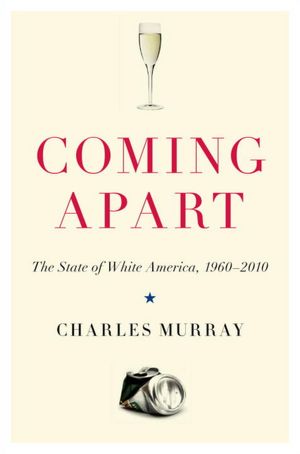 In the course of answering emails, I noticed that my friend Greg Johnson had sent me a link to a blog discussing Charles Murray’s new book Coming Apart. After reading the blog article several times, I realized I had to go buy the book immediately. I’m thankful I did!
In the course of answering emails, I noticed that my friend Greg Johnson had sent me a link to a blog discussing Charles Murray’s new book Coming Apart. After reading the blog article several times, I realized I had to go buy the book immediately. I’m thankful I did!
Although many believe that the complex challenges facing us today cannot be solved through the lens of the American founder’s virtues, Murray writes:
I take another view: The founders were right. The success of America depended on virtue in the people when the country began and it still does in the twenty-first century. America will remain exceptional only to the extent that its people embody the same qualities that made it work for the first two centuries of its existence. The founding virtues are central to that that kind of citizenry.
I wrote RESOLVED: 13 Resolutions for LIFE to bring back character-based ethics into society and the marketplace. In truth, Murray’s and my philosophies align closely, not a shocker since Murray gathered his views from studying numerous sociological studies, while I gathered mine from over 15 years in the living rooms of America. Both methods resulted in the same conclusions: that people with satisfying work, a happy marriage, a high social trust community, and a strong religious foundation are more likely to be happy than people without these four attributes. Of the four, in fact, a happy marriage is the factor that generates the biggest improvement in someone’s happiness score. I can speak on marriage and happiness both personally, experiencing first-hand the increase in happiness when Laurie and I improved our own marriage, and professionally, witnessing many couples improve their marriages and, subsequently, their happiness levels.
Coming Apart reveals that only 10% of respondents who are unmarried, unhappy in jobs, profess no religion, and have low social trust describe themselves as genuinely happy. When a good job is added, the number of respondents stating they were happy increased to 20%. A happy marriage, however, raised the total to 60% declaring they were happy. The final two attributes – high social trust communities and strong religious faith – increased the respondents’ scores an additional 10% each. Thus, from a baseline of 10% of respondents being happy, over 80% of the people who had all four attributes stated they were sincerely happy. In other words, when someone adds these four attributes, his possibilities for a happy life increase by eight times! This is a significant increase and enough to make even the most skeptical of people pause and ponder.
Is there a reciprocal community (high social trust), where people can thrive in compensated communities (high rewards and recognition), learning proper principles for faithful marriages (marriage pack) and the development of a Biblical faith (All Grace Outreach)? There has been since November 1, 2011. Indeed, the reason the LIFE business has grown over 50% in four months is simple: it meets the needs of its community members. No matter how many fearful competitors attack our game-changing strategy, we grow because we satisfy our customers’ innate desire to be happy. People join and stay in LIFE because we focus on the big four (and other) attributes described in countless books on community, like Charles Murray’s Coming Apart. Simply put, we help people grow personally and professionally which leads to increased joy and happiness. I am not just a founder, but I am also a satisfied customer of the growth process materials.
One of the greatest secrets to be learned about life is that happiness cannot be approached directly; rather, it is captured when it’s not being sought. Happiness, in other words, is a by-product of a series of internal victories, which are eventually revealed in the external world. Perhaps you are looking for a community of learners, encouragers, and leaders? Maybe you are resolved to change? As people gather together within the LIFE communities, the world can and will be changed. One million people, here we come!
Sincerely, Orrin Woodward







